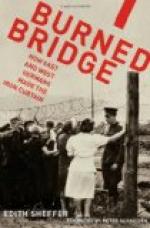“Now I havena got the goods I need an’ I canna get them frae Company sources. But there’s a free trader set himsel’ up tae the north o’ here last season. The North’s no a monopoly for the Company these days, ye ken. They canna run a free trader out i’ the old high-handed fashion. But there’s a bit of the old spirit left—an’ this laddie’s met wi’ difficulties, in a way o’ speakin’. He’s discouraged tae the point where he’ll sell cheap; an’ he’s a fair stock o’ the verra goods I want. I’d tak’ over his stock to-morrow—but he’s ninety-odd miles away. I canna leave here i’ the height o’ the outfittin’ season. I ha’ naebody I can leave in charge.
“The job for ye wad be tae go up there, inventory his stock, take it over, an’ stay there tae distribute it tae such folk as I’d send tae be supplied in that section. Wi’ that completed, transfer the tag-ends doon here. I’d furnish ye a breed tae guide ye there an’ interpret for ye, an’ tae pass on the quality o’ such furs as might offer. He’d grade them, an’ ye’d purchase accordin’. Do ye see? It’s no a job I can put on anny half-breed. There’s none here can write and figure.”
“As it sounds,” Thompson replied, “I daresay I could manage. You said it would be worth my while. What do I gather from that?”
“Ye’d gather two dollars a day an’ everything supplied,” MacLeod returned dryly. “Will ye tak’ it on?”
Thompson stared into the fire for a minute. Then he looked up at the Factor of Fort Pachugan.
“I’m your man,” he said briefly.
“Good,” MacLeod grunted. “An’ when ye go back tae the preachin’ ye’ll find the experience has done ye no harm. Now, we’ll go over the seetuation in detail to-morrow, an’ the next day ye’ll start north, wi’ Joe Lamont. The freeze-up’s due, an’ it’s quicker an’ easier travelin’ by canoe than wi’ dogs.”
They talked desultorily for half an hour, until MacLeod, growing drowsy before the big fire, yawned and went off to bed, after pointing out a room for his guest and employee-to-be.
Thompson shut the door of his bedroom and sat down on a stool. He was warm, comfortable, well-fed. But he was not happy, unless the look of him belied his real feelings. He raised his eyes and stared curiously at his reflection in a small mirror on the wall. The scars of Tommy Ashe’s fists had long since faded. His skin was a ruddy, healthy hue, the freckles across the bridge of his nose almost wholly absorbed in a coat of tan. But the change that marked him most was a change of expression. His eyes had lost the old, mild look. They were hard and alert, blue mirrors of an unquiet spirit. There was a different set to his lips.
“I don’t look like a minister,” he muttered. “I look like a man who has been drunk. I feel like that. There must be a devil in me.”
He had brought with him from Lone Moose a small bag. Out of this he now took paper, envelopes, a fountain pen, changed his seat to the edge of the bed, and using the stool for a desk began to write. When he had covered two sheets he folded them over the green slip he had that day received, and slid the whole into an envelope which he addressed:




